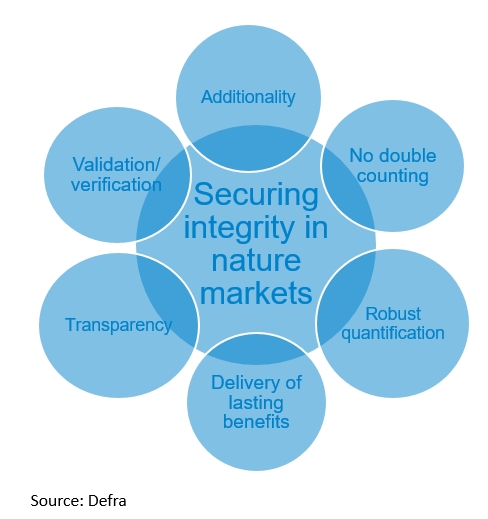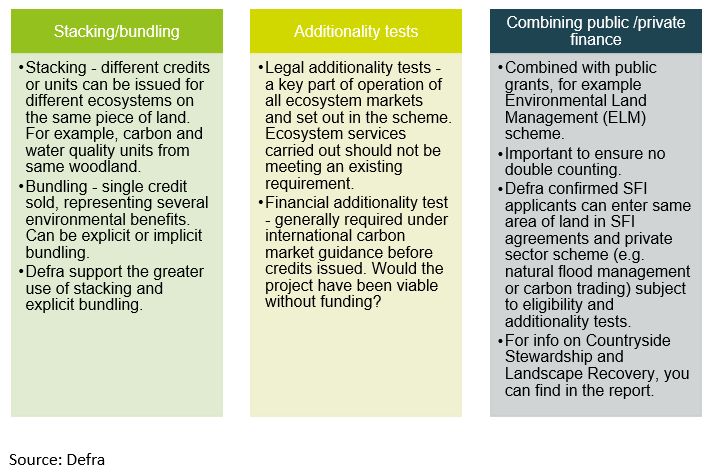Analyst Insight: Defra’s Nature Markets Framework, what you need to know.
Thursday, 13 April 2023
Market commentary
- Old crop UK feed wheat futures (May-23) closed yesterday at £194.75/t, down £0.35/t from Tuesday’s close. New-crop futures (Nov-23) gained £0.35/t over the same session, closing at £211.45/t.
- Global wheat contracts were mixed yesterday, with Paris milling wheat feeling some slight pressure helped down by a stronger euro, whereas Chicago wheat contracts gained slightly. Volatility continues as the market assesses the latest news on Russia and Ukraine, assessing whether the Black Sea Initiative will be renewed next month.
- Attention is turning to unsold old crop in the EU, Ukraine and Russia, which will either need to be sold ahead of the new harvest or carried as stocks (Refinitiv). Cheap Black Sea grain has pressured global markets for months and continues to do so.
- Paris rapeseed futures (May-23) closed yesterday at €449.50/t, down €11.00/t from Tuesday’s close. This followed some pressure in Malaysian palm oil futures (three months delivery from spot), falling nearly 3% yesterday from weakness in the wider vegetable oil complex and a firmer currency.

Defra’s Nature Markets Framework, what you need to know.
Recently, Defra released updates on how they plan to support farmers and land managers in confidently accessing private sector payments alongside public payments (e.g., the Environmental Land Management scheme), for providing environmental benefits in England.
There are increasing opportunities for accessing funding through private nature markets, receiving payments for carbon sequestration, improving water quality, and enhancing biodiversity. You can find the latest analysis on carbon markets on the AHDB website.
Defra set out a target for private investment into nature recovery to meet at least £500 million per year by 2027, to then reach over £1 billion per year by 2030 in England. For the devolved nations, Defra have committed to work closely with devolved administrations to align policies where appropriate and build on successful joint initiatives.
At the end of March, Defra released information both on the Green Finance Strategy to attract investment, and Nature Markets Framework. Developing high-integrity nature markets is reportedly key to Defra’s strategy, to mobilise investment in the environment.
Today, I look at the Nature Markets Framework. I pick out some key takeaways and unpick what this might mean for you.
Understanding the Nature Markets Framework
Nature markets enable private investment in nature, through creating units or credits that can be bought or sold. Though investment could also be in other non-credit ways, for example repayable finance for projects. Markets can either be voluntary or regulatory.
These markets allow businesses to invest with farmers, and other land/coastal managers to enhance the ability of natural and farmed land, freshwater and marine habitats to provide nature recovery, carbon, clean water, and other benefits.
Some elements of nature markets are already well established, for example UK Woodland Carbon Code and UK Peatland Code. Whereas other areas are new and emerging, for example voluntary carbon markets. Coming down the line, the Forestry Commission are exploring development of a Woodland Water Code by March 2025.
This Nature Markets Framework is to scale up existing markets, though this may take a few years. Defra are working with the British Standards Institution (BSI) to develop a range of nature investment standards which provide clear rules for how farmers can access payments from nature markets.
Knowing what is on offer, and how to access these nature markets, both through government schemes and private markets, is an essential tool for farmers for business resilience. AHDB continue to support the industry through providing information surrounding developing markets, specifically carbon markets.
Core principles of nature markets
At AHDB, we have talked before about ensuring market value for credits through meeting four requirements: credibility, additionality, permanence and verifiability. Defra too have laid out the core principles to ensure integrity and value in markets. This means credits are robustly verified and transparently documented, with no double counting or greenwash.
For definitions and more information on these areas, you can follow the link to the report.
All these core principles are vital to secure value in credits. I focus in on two areas, the first no double counting. This means quantified credits/units of same ecosystem service cannot be sold twice or used as basis for two claims. Additionality means credits need to be based on new environmental improvements, verified against an appropriate baseline.
Mentioning a baseline, a key action now if you are unsure how to get involved, is understanding what you have on-farm: creating a baseline. This is because you need to show additionality and improvement, for market value. For example, using a carbon calculator to understand your own farm’s carbon emissions. The bigger the baseline (number of years), the better (more robust). Choose a calculator that works best for you and stick with it.
On the wider picture on measuring, Defra also confirmed that they are developing a consistent approach for measuring emissions from farms. By 2024, Defra will set out how farmers will be supported to understand their emissions through carbon audits.
Market rules
Defra have also explained market rules within their framework. Important considerations when exploring nature markets.
Within the report, Defra announced they have commissioned the Green Finance Institute to develop an online toolkit for farmers to identify and navigate opportunities across nature markets, due to be available this summer. Something to look out for.
What does this mean for you?
There is a lot of new information in these releases. A key takeaway is that there is value in providing environmental benefits, not just soil health benefits, but also as value through government schemes and private markets.
A clear goal of Defra’s is to encourage farmers to get involved, and to add credibility to private nature markets to incentivise investment. Over the next few years, we are expecting the development of nature investment standards with BSI, as well as developing a consistent approach to measuring emissions. This development of standards brings more oversight into voluntary markets, though builds on the core principles of credits, which inherently links to value too. Some concerns remain across the industry in securing integrity in nature markets. However, this news brings a step forward in understanding the direction of these markets, though results of these new commitments may be some time down the line.
If you are looking to get involved in a scheme, it is recommended you seek legal advice. It is also worth understanding what supply chain commitments you might already have across environmental objectives. Looking to carbon markets specifically, what we do know is that voluntary market value is likely to increase going forward, as companies look to reduce their environmental impact. Something to consider.
Unsure where to start, building a baseline for environmental outcomes your farm will be key to establishing value. Do you know what carbon emissions and stocks you already have on farm?
How can I access more information?
Do you have a question regarding carbon markets? To get in touch with us, contact our email address: carbon.markets@ahdb.org.uk.
You can also access information on carbon markets on the AHDB website here.
Sign up for regular updates
You can subscribe to receive Grain Market Daily straight to your inbox. Simply fill in your contact details on our online form and select the information you wish to receive.
While AHDB seeks to ensure that the information contained on this webpage is accurate at the time of publication, no warranty is given in respect of the information and data provided. You are responsible for how you use the information. To the maximum extent permitted by law, AHDB accepts no liability for loss, damage or injury howsoever caused or suffered (including that caused by negligence) directly or indirectly in relation to the information or data provided in this publication.
All intellectual property rights in the information and data on this webpage belong to or are licensed by AHDB. You are authorised to use such information for your internal business purposes only and you must not provide this information to any other third parties, including further publication of the information, or for commercial gain in any way whatsoever without the prior written permission of AHDB for each third party disclosure, publication or commercial arrangement. For more information, please see our Terms of Use and Privacy Notice or contact the Director of Corporate Affairs at info@ahdb.org.uk © Agriculture and Horticulture Development Board. All rights reserved.



